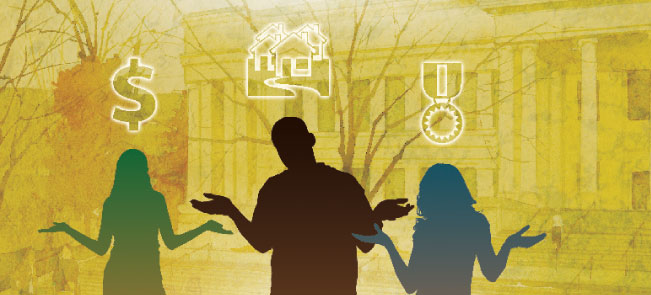

So, What Is This Degree Really Worth?
Some 5,000 undergraduates received a degree from
the University in May, and that means more than a deeper bank account
for each of them—it means a ticket to a better society.
by Kelley J.P. Lindberg
Sitting on the steps, three young women rifle through book bags; one sips a diet soda and bemoans a looming research paper deadline. Another woman in black crop pants and flip flops juggles her sunglasses, coffee, shoulder bag and cell phone as she hurries to a class in the business building. A camo-clad young man lies across a bench, grabbing a nap in the sunshine, backpack pillowing his shaggy-haired head, white iPod earbuds firmly in place, textbook lying on his chest.
For these students, it’s just another day at the U, worrying about grades and classes and the next exam. They probably don’t realize that by being at the U, they’re doing more than just getting a degree. They’re about to get a license to help improve society.
These students, along with most of the 28,000-plus others at the University of Utah, know that getting a college degree is the best thing they can do for their futures. Money-wise, a degree is golden: the average annual salary for a Utah adult with a four-year bachelor’s degree is nearly twice that of a high school graduate. Over a lifetime, that can mean a million dollars more in total earnings.
Career-wise, a degree is power: it puts students on a faster track to the best-paying, highest-level, most interesting jobs.
Fulfillment-wise, a degree is manna: it starts them on a path of lifelong learning and enrichment.
Of course, all those perks have to be earned. It takes a tremendous amount of hard work, energy, and cash to attend a college or university and land that degree. But the personal payoffs look pretty good. And over the last few decades, the emphasis on those personal payoffs has escalated.
Economic volatility, illustrated by events such as recessions, the dot-com implosion, and corporate downsizing, has placed a premium on good jobs. In the minds of worried parents, that leaves little room for intangibles like “the common good.” Couple that with the “everyone-for-themselves” attitude that has become the hallmark mindset of contemporary society, and it’s easy to see why the potential for personal gain has become paramount.
As a result, schools across the country are putting greater emphasis on their career-building programs. Newspapers print full-color charts showing how the salary of degree-holders rises in a nice green line much faster than the sluggish red line symbolizing those holding only a high school diploma. Political funding debates increasingly address how students should shoulder more of the financial burden for their own education. Higher education is for each individual’s betterment, after all.
“There’s a strong correlation between higher education and higher earnings,” says Michael K. Young, president of the University of Utah, “But what’s really interesting are the societal benefits.”
Hang on a sec. Did he say “societal benefits”?
In a time when Americans seem to be growing increasingly self-obsessed and parochial, “societal benefits” doesn’t sound like much of a selling point.
The thinking is: Getting a higher education gives me financial security. It gives me an edge in my career, knowledge, and the ability to thrive in a competitive world. So why should I care if my neighbors get a degree?
For starters, according to the report “Education Pays 2004,” produced by The College Board (the nonprofit association responsible for the SAT, the PSAT/NMSQT, and the Advanced Placement Program), an average college graduate with a bachelor’s degree pays about twice the taxes each year as someone with only a high school diploma. Those with a professional degree pay nearly $20,000 more per year on average.
But college graduates don’t just put more money into the state—they take less out, too. The same report states, “The government spends between $800 and $2,700 per year less on social programs for individual 30-year-old college graduates than for high school graduates of the same age, gender, and race/ethnicity.” These social programs include unemployment compensation, food subsidies, welfare, Medicaid and Medicare, and other similar public assistance.
In 2005-06, nearly 5,000 students received undergraduate degrees from the University of Utah. Using the lower end of the scale—$800 savings per graduated student—President Young calculates: “We saved the state approximately four million dollars per year by graduating those 5,000 students last year.”
Another societal benefit: In all race and ethnicity groupings, the unemployment rate for college graduates is at least half the rate of high school grads.
Christine Kearl, the education deputy for Utah Gov. Jon Huntsman, Jr., recognizes the value higher education brings to the state. “Any investment in public education and higher education is an investment in the economic development and the continuing tax base of Utah,” she says.
 From the point of view of economic development, a well-educated population equates to a deeper employment pool. And that workforce is more adept at problem-solving, more innovative, and more likely to increase a company’s productivity and competitive edge. A well-educated population can attract (or deter) businesses looking to relocate. From the point of view of economic development, a well-educated population equates to a deeper employment pool. And that workforce is more adept at problem-solving, more innovative, and more likely to increase a company’s productivity and competitive edge. A well-educated population can attract (or deter) businesses looking to relocate.
Greg Spencer, director of education for Intermountain Health Care, one of the largest employers in Utah, says the success of his company depends on an educated workforce. “Many of our positions require the education that a college degree provides, such as accountants, nurses, pharmacists, physical therapists, and allied health professionals.”
But specific career training isn’t the only reason Intermountain seeks college graduates. “A college degree prepares people to be better contributors to the organization. It helps them learn how to observe and pay attention to things around them and improve them,” says Spencer. “They’re better prepared to make every day a better day because they’re able to make improvements in their job and to solve problems.”
Spencer cites another reason Intermountain hires college graduates: “They come better prepared to work with people in general, and to work with people from diverse backgrounds, diverse viewpoints, and diverse ways of doing things.” Because they are experienced at interacting with different types of people, employees with college degrees are, he says, “more effective contributors, not only as they work with each other, but also as they work with patients.”
It’s clear that higher education benefits individuals, businesses, and the state’s tax base. That’s all well and good, but it’s still all about money. What about those other societal benefits?
Statistically, compared to their high school graduate neighbors, college graduates have significantly lower poverty rates, better health, and a larger percentage of children who know their numbers and alphabet before kindergarten. They smoke less, are less likely to end up incarcerated, and vote in greater numbers. They donate more blood and are twice as likely to volunteer their time for a good cause.
At a college or university, students are generally exposed to a much larger diversity of people, realms of thought, cultures, and existing knowledge, and they’re encouraged to analyze and consider problems in creative ways. Because of this exposure, college graduates tend to be more world-aware and more willing to see the far-reaching ramifications of their actions, which in turn makes them more capable of affecting the society around them in positive ways.
At the University of Utah, says President Young, “We don’t just talk about how to make money. We talk about what it means to live a good life—ethics, responsibility, character.”
The U’s Lowell Bennion Community Service Center, which helps students, faculty, staff and alumni devise and participate in community service projects, counts 6,000-plus participants donating more than 150,000 hours of community service each year. And that doesn’t include individual schools and departments at the U of U that offer pro-bono services, such as the S.J. Quinney College of Law’s legal aid programs for the underprivileged, among others.
“Community service is woven into the fabric of a university education,” says Young. “Every day, in every way, you’re taught that the responsibility imposed on you by receiving a great education is to give back to your society and community.”
Even though phrases like “the greater good” may seem old-fashioned and trite in this modern era, perhaps it’s time to take a second look at the thought behind the words. Has the adage “a rising tide floats all boats” been forgotten? Bolstering individual citizens does the same for an entire community, and it’s more likely to sustain those citizens and that community over the long haul.
Marian Wright Edelman, founder and president of the Children’s Defense Fund, an advocacy group for poor and minority children and those with disabilities, recognized that education is more than an individual’s goal when she said, “Education is for improving the lives of others and for leaving your community and world better than you found it.”
 By de-emphasizing community gains and focusing on the personal benefits of higher education, society may be inadvertently shooting itself in the foot. Shifting more of a college education’s expense to the individual may seem sound in the short term but could also stunt a community’s long-term growth. By de-emphasizing community gains and focusing on the personal benefits of higher education, society may be inadvertently shooting itself in the foot. Shifting more of a college education’s expense to the individual may seem sound in the short term but could also stunt a community’s long-term growth.
“The more we support the colleges and universities in this state, the more likely we are to create the kind of society we want to live in,” says President Young.
In a time of declining enrollment and societal instability, one question remains: How can we make sure that all members of our society understand that while higher education is an unbeatable way to improve a student’s lot, it’s really worth more than that—it’s also a license to help improve the society we all live in?
The answer is not likely to come from P.R. offices and press releases. Rather, it will probably be found at the grassroots level. As college graduates themselves go out into their respective communities, they can effect change by impressing upon their colleagues and their own children the value of higher education as a salve to help heal some of modern society’s ills. And as this new generation of graduates become leaders, they may help to reverse the erosion of altruistic thinking and recognize the importance of supporting higher education to the benefit of more than just those individuals who already have the means to pay for it.
But, like most meaningful transformations, this will take time.
Meanwhile, the future leader with the iPod rouses from his nap, runs a hand through his rumpled hair, and heads for his next class. The soon-to-be catalyst for change with the diet soda dashes off to the library to research her paper.
These students have a lot of work ahead of them. There’s homework to be done, classes to attend, ideas to cultivate, causes to advance, societies to examine, and leaders to forge. And there are always plenty of boats to float.
—Kelley J. P. Lindberg BS’84 is a Layton-based freelance writer.
Return to Summer 2007 table of contents
|



